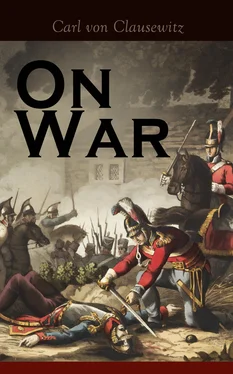If the decision by arms lies at the foundation of all combinations, then it follows that the enemy can defeat each of them by gaining a victory on the field, not merely in the one on which our combination directly depends, but also in any other encounter, if it is only important enough; for every important decision by arms—that is, destruction of the enemy’s forces—reacts upon all preceding it, because, like a liquid element, they tend to bring themselves to a level.
Thus, the destruction of the enemy’s armed force appears, therefore, always as the superior and more effectual means, to which all others must give way.
It is, however, only when there is a supposed equality in all other conditions that we can ascribe to the destruction of the enemy’s armed force the greater efficacy. It would, therefore, be a great mistake to draw the conclusion that a blind dash must always gain the victory over skill and caution. An unskilful attack would lead to the destruction of our own and not of the enemy’s force, and therefore is not what is here meant. The superior efficacy belongs not to the means but to the end , and we are only comparing the effect of one realised purpose with the other.
If we speak of the destruction of the enemy’s armed force, we must expressly point out that nothing obliges us to confine this idea to the mere physical force; on the contrary, the moral is necessarily implied as well, because both in fact are interwoven with each other, even in the most minute details, and therefore cannot be separated. But it is just in connection with the inevitable effect which has been referred to, of a great act of destruction (a great victory) upon all other decisions by arms, that this moral element is most fluid, if we may use that expression, and therefore distributes itself the most easily through all the parts.
Against the far superior worth which the destruction of the enemy’s armed force has over all other means stands the expense and risk of this means, and it is only to avoid these that any other means are taken. That these must be costly stands to reason, for the waste of our own military forces must, ceteris paribus , always be greater the more our aim is directed upon the destruction of the enemy’s power.
The danger lies in this, that the greater efficacy which we seek recoils on ourselves, and therefore has worse consequences in case we fail of success.
Other methods are, therefore, less costly when they succeed, less dangerous when they fail; but in this is necessarily lodged the condition that they are only opposed to similar ones, that is, that the enemy acts on the same principle; for if the enemy should choose the way of a great decision by arms, our means must on that account be changed against our will, in order to correspond with his . Then all depends on the issue of the act of destruction; but of course it is evident that, ceteris paribus , in this act we must be at a disadvantage in all respects because our views and our means had been directed in part upon other objects, which is not the case with the enemy. Two different objects of which one is not part, the other exclude each other, and therefore a force which may be applicable for the one may not serve for the other. If, therefore, one of two belligerents is determined to seek the great decision by arms, then he has a high probability of success, as soon as he is certain his opponent will not take that way, but follows a different object; and every one who sets before himself any such other aim only does so in a reasonable manner, provided he acts on the supposition that his adversary has as little intention as he has of resorting to the great decision by arms.
But what we have here said of another direction of views and forces relates only to other positive objects , which we may propose to ourselves in War, besides the destruction of the enemy’s force, not by any means to the pure defensive, which may be adopted with a view thereby to exhaust the enemy’s forces. In the pure defensive the positive object is wanting, and therefore, while on the defensive, our forces cannot at the same time be directed on other objects; they can only be employed to defeat the intentions of the enemy.
We have now to consider the opposite of the destruction of the enemy’s armed force, that is to say, the preservation of our own. These two efforts always go together, as they mutually act and react on each other; they are integral parts of one and the same view, and we have only to ascertain what effect is produced when one or the other has the predominance. The endeavour to destroy the enemy’s force has a positive object, and leads to positive results, of which the final aim is the conquest of the enemy. The preservation of our own forces has a negative object, leads therefore to the defeat of the enemy’s intentions, that is to pure resistance, of which the final aim can be nothing more than to prolong the duration of the contest, so that the enemy shall exhaust himself in it.
The effort with a positive object calls into existence the act of destruction; the effort with the negative object awaits it.
How far this state of expectation should and may be carried we shall enter into more particularly in the theory of attack and defence, at the origin of which we again find ourselves. Here we shall content ourselves with saying that the awaiting must be no absolute endurance, and that in the action bound up with it the destruction of the enemy’s armed force engaged in this conflict may be the aim just as well as anything else. It would therefore be a great error in the fundamental idea to suppose that the consequence of the negative course is that we are precluded from choosing the destruction of the enemy’s military force as our object, and must prefer a bloodless solution. The advantage which the negative effort gives may certainly lead to that, but only at the risk of its not being the most advisable method, as that question is dependent on totally different conditions, resting not with ourselves but with our opponents. This other bloodless way cannot, therefore, be looked upon at all as the natural means of satisfying our great anxiety to spare our forces; on the contrary, when circumstances are not favourable, it would be the means of completely ruining them. Very many Generals have fallen into this error, and been ruined by it. The only necessary effect resulting from the superiority of the negative effort is the delay of the decision, so that the party acting takes refuge in that way, as it were, in the expectation of the decisive moment. The consequence of that is generally the postponement of the action as much as possible in time, and also in space, in so far as space is in connection with it. If the moment has arrived in which this can no longer be done without ruinous disadvantage, then the advantage of the negative must be considered as exhausted, and then comes forward unchanged the effort for the destruction of the enemy’s force, which was kept back by a counterpoise, but never discarded.
We have seen, therefore, in the foregoing reflections, that there are many ways to the aim, that is, to the attainment of the political object; but that the only means is the combat, and that consequently everything is subject to a supreme law: which is the decision by arms; that where this is really demanded by one, it is a redress which cannot be refused by the other; that, therefore, a belligerent who takes any other way must make sure that his opponent will not take this means of redress, or his cause may be lost in that supreme court; hence therefore the destruction of the enemy’s armed force, amongst all the objects which can be pursued in War, appears always as the one which overrules all others.
What may be achieved by combinations of another kind in War we shall only learn in the sequel, and naturally only by degrees. We content ourselves here with acknowledging in general their possibility, as something pointing to the difference between the reality and the conception, and to the influence of particular circumstances. But we could not avoid showing at once that the bloody solution of the crisis , the effort for the destruction of the enemy’s force, is the firstborn son of War. If when political objects are unimportant, motives weak, the excitement of forces small, a cautious commander tries in all kinds of ways, without great crises and bloody solutions, to twist himself skilfully into a peace through the characteristic weaknesses of his enemy in the field and in the Cabinet, we have no right to find fault with him, if the premises on which he acts are well founded and justified by success; still we must require him to remember that he only travels on forbidden tracks, where the God of War may surprise him; that he ought always to keep his eye on the enemy, in order that he may not have to defend himself with a dress rapier if the enemy takes up a sharp sword.
Читать дальше












